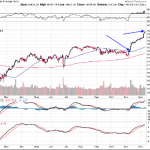Overview: The dramatic sell-off in equities center stage after the S&P 500 lost 3% and the Nasdaq shed 4% yesterday. Stocks in Asia-Pacific followed suit, with the Nikkei’s 3.75% drop setting the pace. Of note, the Shanghai Composite was essentially flat. European bourses are struggling to hold on to some early gains, especially in Germany where the IFO survey showed a deterioration of investor confidence. Bond markets are firm with yields in Asian playing catch-up to the drop in the US yesterday. European peripheral yields are mostly slightly lower, but Italy’s 10-year benchmark is off six basis points (to 3.55%), while Italian bank shares are snapping a six-day slide. The dollar is softer against most of the major currencies, though the Japanese yen and Swiss franc are laggards, alongside the New Zealand dollar, which has been pressured a bit by the larger than expected trade shortfall (though both exports and imports rose). The dollar is mixed among the emerging market currencies. European currencies, including the Turkish lira, are faring better than East Asia. The South Korean won is the weakest following a disappointing Q3 GDP report that saw investment drop for the second consecutive quarter. Foreign investors continue to liquidate Korean shares. There has only been one session this month (October 12) that foreign investors bought Korean shares. At pixel time, the S&P 500 is called around 1.0% higher as it tries to snap a six-day drop. It has only advanced four sessions this month, coming into today.

ECB: Imagine the news summary ECB received as the two-day meeting began yesterday. The day before, the Bundesbank warned that the German locomotive may have stalled in Q3. The flash composite PMI for October fell to its lowest level since September 2016 (52.7 vs. 52.6), which is a three-old time series. The erosion of the German PMI was echoed in the deterioration on investor confidence and expectations in today’s IFO report. Europe’s largest bank reported disappointing earnings and the share price fell to record lows. Italy and the EC have begun a macabre slow dance, while the impatient markets are pushing Italian yields higher, spread wider, and bank shares lower.













Leave A Comment